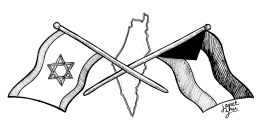In mid-May, two Palestinian boys were killed by Israeli security forces during demonstrations in the West Bank.
Although video footage shows the demonstrations as non-threatening, not a peep was heard from the international community. But in June, three Israeli teenagers went missing, and the world tripped over itself to condemn the disappearances.
Without a shred of evidence, the Israeli government was quick to blame Hamas for the affair, a claim that came just weeks after a unity agreement between Hamas and the Palestinian Authority to form a nonpartisan government.
Not one to miss an opportunity, Israeli Prime Minister Benjamin Netanyahu used the incident to level a campaign of collective punishment against Palestinians, a tactic considered a war crime by the international community. Ironically, there is a tendency that when Palestinians are suffering, commentators focus more on their political failings than on these persistent human rights violations.
In the West Bank, Israeli forces have arrested more than 500 Palestinians and killed at least 10 in search of an elusive culprit. In Gaza, Israel launched its third major aerial offensive in seven years. Nearly 200 people have been killed, the vast majority of whom are civilians, according to international aid agencies. Meanwhile, there have been no Israeli casualties, and rockets fired from Gaza in response have posed only a minimal threat to the safety of the average civilian.
Despite Israel’s responsibility for breaking the cease-fire, Hamas is cast as the perpetual aggressor. Palestinians are blamed in a typically racist fashion for glorifying death and promoting a culture of martyrdom, while it is Israelis who are legally obligated to join a military whose glorification of a presumably much more heinous act, killing, is well documented from the inside. Israel justifies civilian deaths by accusing Hamas of using human shields, but has never substantiated a claim that weapons were stored in a house or public place that they targeted.
Since 2007, rather than demonstrating fear or frustration, the Israeli government, in correspondence with the United States, has explicitly expressed its pleasure at Hamas’ success, citing its political prominence as an excuse to treat Gaza as a belligerent neighbor. In Gaza, they are targeting a captive population in one of the most densely populated areas in the world.
Homes and schools are indiscriminately fired upon with comically little warning. Citizens are mockingly asked to evacuate but are prevented from going anywhere safe by borders sealed by their attackers.
Hospitals, struggling to treat the wounded, are overcrowded and equipped with tragically few resources because of the ongoing blockade imposed by both Israel and Egypt.
Immediate, militant violence from Israel supplements the more insidious political violence of which Palestinians in Gaza have been victims for years — an offense that is in itself a form of assault that will continue after any cease-fire is reached.
Staggering numbers are denied access to jobs, food, clean water and mobility even in times of relative peace. This week’s events represent not an act of self-defense, but merely another installment in an ongoing campaign of deliberate destruction.
Despite claims to the contrary, the Israeli occupation of Gaza has never legally ended. As a military occupier under international law, Israel is in fact under obligation to protect and maintain the welfare of the people it is currently killing.
Its proclivity to do the opposite resulted in the deaths of more than 500 Palestinians at the hands of Israeli security forces between January 2009 and May 2014. Less than 50 Israelis, including security personnel, were killed by Palestinians in that time, according to Israeli human rights organization B’Tselem.
The offensive, dubbed Operation Protective Edge, really has very little to do with protection. It is an offensive, methodical move undertaken by Netanyahu in a time of political insecurity. And it is heir to a long legacy of violence by a colonial power whose objective was never to live peacefully beside its neighbors.
Consider this quotation from a founding father of Israel, David Ben-Gurion, who wrote in a 1937 letter to his son: “We must expel Arabs and take their place.”
And it’s a move straight from his playbook to fabricate a war to do it.
Leila Shebaro is a rising senior in the School of Foreign Service. She is the president of Students for Justice in Palestine.




















